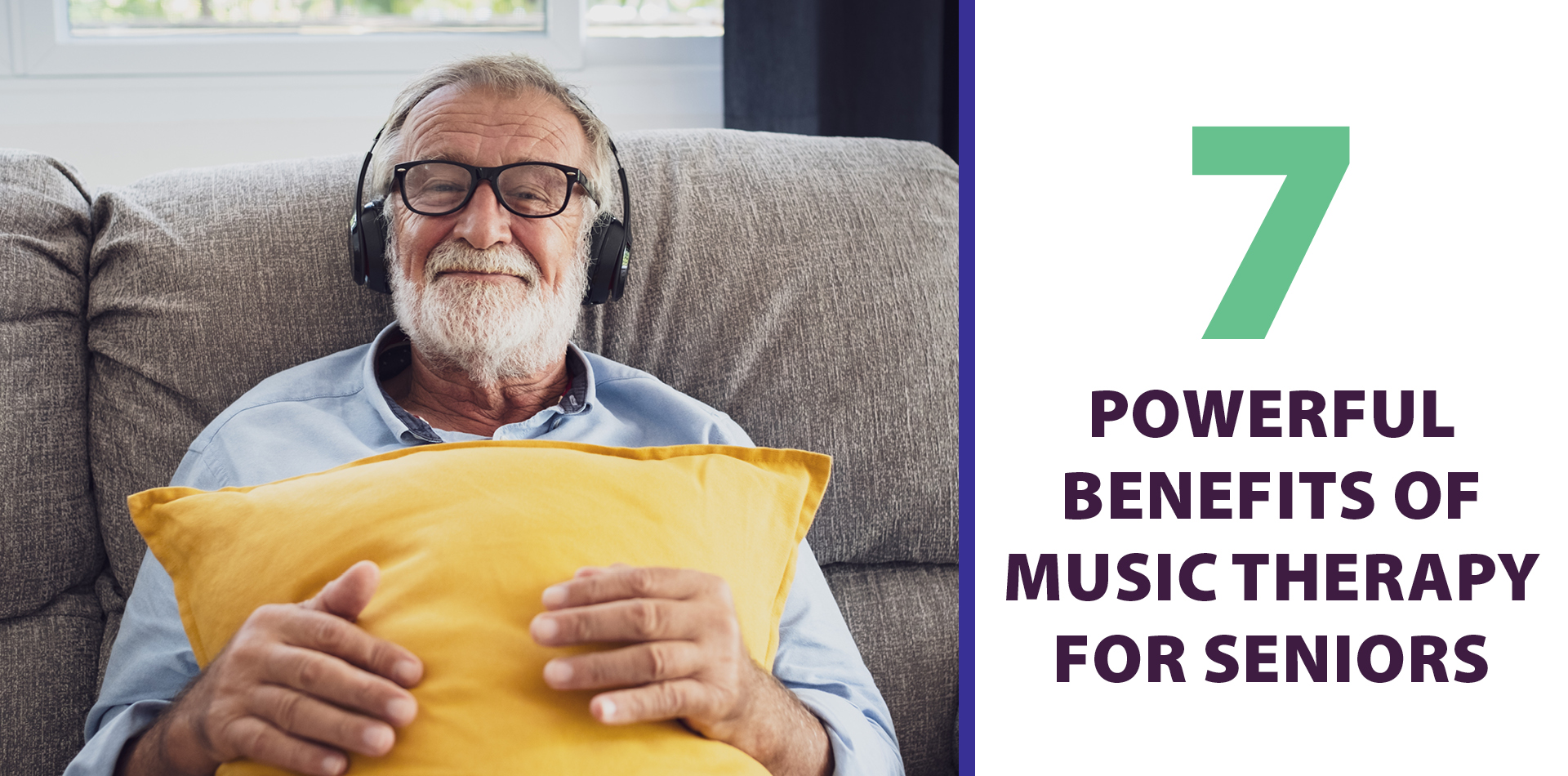
Who can deny the power of music? It has the ability to stir up memories and emotions, bringing people back to happier times. The right music can even completely change a person’s mood – turning a bad day into a good one.
People don’t need to be passionate about music. Even the most disinterested person will respond to music to some degree or another.
Today, we’re taking things a step further. We’re interested in the benefits of music therapy for seniors.
What Is Music Therapy?
According to the American Music Therapy Association, music therapy is defined as “the clinical & evidence-based use of music interventions to accomplish individualized goals within a therapeutic relationship by a credentialed professional who has completed an approved music therapy program”.
This definition means that music therapy must be conducted with a board-certified music therapist. If such a therapist isn’t involved, then we’re not talking about music therapy. It’s as simple as that.
The therapy they provide can have a variety of goals, such as managing stress, improving memory, reducing pain, and promoting wellness.
One of the most powerful features is that music therapy is tailored to the individual. Not only does this mean that the sessions are based on the patient’s needs, but the therapist can also adapt the techniques used based on the way that patients respond to stimuli and any changes in their needs during the session.
How Music Therapists Are Trained
Music therapists are highly trained, with a background in music, psychology, and medicine. They also need at least a bachelor’s degree in music therapy, along with 1,200 hours of clinical training (that’s a lot of hours!).
What’s more, music therapists need to pass a board certification exam and intern under the guidance of a board-certified therapist.
It is only after all of these criteria have been met that individuals are able to call themselves music therapists and use the credential MT-BC after their name. Some music therapists take their education even further, completing master’s degrees or even doctorates.
Who Are The Clients?
Music therapy clients come from all backgrounds – and don’t need any particular skills in music to benefit from the sessions.
Even among the geriatric population, many different populations can be helped, including those in memory care, medical care, private practice, rehabilitation, and hospice care. Not surprisingly, the goals and objectives of music therapy can vary dramatically between these different populations, as can the benefits.
Benefits of Music Therapy for Seniors
Boosts Mood
Even just listening to music can boost your mood, especially if you choose a favourite feel-good song. Music therapy can be even more powerful, as it is a tailored intervention that focuses on the needs of the client.
Music therapists can adapt their approaches based on the goals of the session and how the client responds. This is particularly relevant for patients with chronic conditions or neurological disorders.
May Help With Pain Management
Music therapy is often to reduce both anxiety and pain in patients undergoing painful procedures. The music is commonly used in conjunction with other pain management approaches and can be effective.
This suggests that music therapy may be relevant for pain management in other situations too – including seniors with chronic pain.
Can Promote Social Engagement
Music therapy has been shown to help with social engagement as well. This is a particularly important effect, as loneliness and isolation are linked to considerable negative health outcomes. Loneliness is also a common issue for seniors, reinforcing the high value of any activities that promote social connection.
Music therapy partly achieves this goal due to the interaction between the therapist and the client. Music therapy can also be conducted with a group, rather than just an individual client. This approach provides the chance for interaction between the group members.
Offers Physical Benefits
There are notable physical benefits to music therapy too, especially as some activities involve active participation, such as drumming. At the same time, music therapy may also lower the risk of some illnesses, particularly because it can help to decrease stress and promote relaxation.
Can Help Dementia Patients Relax
Even dementia patients can connect with music at some level. Music therapists are able to use this association to help reduce agitation in dementia patients and also decrease behavioural issues.
May Improve Cognition
Music therapy is often associated with improved memory and cognition, perhaps partly because it can involve patients remembering patterns and staying engaged.
Research also shows that the cognitive benefits of music therapy for seniors extend to dementia patients, potentially helping to slow cognitive decline.
Can Improve Quality Of Life
Music therapy has also been associated with improved quality of life – which isn’t surprising, given the benefits we’ve already talked about. The quality of life improvements even extends to institutionalized seniors.
Indeed, music therapy could be particularly relevant for seniors in this situation, as they mightn’t be getting much stimulation in their daily lives.
Can You Practice Music Therapy At Home?
It may seem like you can simply take the principles of music therapy and apply them at home.
However, this isn’t the case. After all, music therapists are highly trained and have a considerable background in working with clients – including clients who are vulnerable.
Music therapists can carefully plan sessions and quickly adapt them to how the client responds and their needs. It would be impossible to do this effectively without the many hours of training that music therapists work through.
As a caregiver, could you read the subtle signs that a technique isn’t quite right? Could you recognize when a given approach is actually causing harm? Would you know what approaches would have the best long-term effects? You wouldn’t even know all the potential activities, much less their benefits and risks.
In fact, attempting music therapy at home could even be dangerous. After all, if music therapy has the ability to reduce anxiety, improve quality of life, reduce pain, and improve mood – poorly performed music therapy could easily have the reverse impacts.
At-Home Music Enrichment Activities
As you can see, music therapy for seniors comes with many benefits. But, what if you can’t afford music therapy or it just isn’t a suitable option right now?
One option is music enrichment activities.
Think of these a little like using a CBT or mindfulness app, rather than going to a therapist.
By doing so, you miss out on the therapist’s considerable expertise and you get a fairly generic form of mental health support. Not surprisingly, working with a therapist tends to be safer and often produces better results.
The same is true here. Music at home certainly offers many benefits, but it cannot replace the skill of a certified music therapist.
You also need to pay close attention to how the senior responds and remain cautious. Just like self-taught CBT or CBT conducted via an app, music enrichment activities at home could cause harm in some contexts.
Here are our top five activities that you can practice at home.
1. Simply Play Music
Taking advantage of music doesn’t have to be complicated. Sometimes, the easiest answers are also the most effective.
As such, the first idea is to just play music around the home.
There are a number of ways to do this, such as using speakers, a CD player or playing music through a computer. For seniors who are hard of hearing, you might even consider playing music through a phone and giving them headphones.
Music is also easy to find. Services like Spotify and Pandora allow you to stream music, offering many playlists for you to choose from. Free versions of these programs often come with ads, but they aren’t too intrusive.
2. Create a Sing-along
One way to increase the benefits of music is to get seniors engaged.
Sing-alongs are one way to do that. Singing along to music can be exceptionally fun and often takes people out of the moment that they’re in.
This can be as simple as choosing a song or two and telling the senior that you’re going to sing along to it, together. Doing it together is important, as it helps reduce any self-consciousness.
You may also need to provide the lyrics in some way.
This might be through an app or even just on a printed sheet of paper. Some recent musicals also have sing-along versions, where the words pop up on screen and can be easily followed.
These can work well too, but you’ll need to make sure the senior likes whatever music you choose to sing along to.
3. Drum Along
Some senior homes use a drum circle approach, where people use actual or makeshift drums to keep in time with music. The idea works surprisingly well for people with dementia, as they retain a rhythmic instinct.
This is something that you can do at home as well. You can even use the tops of cardboard boxes as makeshift drums.
The approach works best with more than one person. The best way is simply for you to get involved as well. Who knows? You might find it fun.
4. Develop a Playlist
Another idea is to work with the seniors to develop a playlist that is uniquely tuned to them – one that will make them feel good.
Many different apps will support this function, along with programs like Spotify. You can often build playlists easily and even share them among friends. You might even create multiple playlists, so you have options for different moods and situations.
The process can be a very enjoyable one. You can use speakers or headphone splitters to allow both yourself and the senior to listen to the same music.
5. SingFit
Finally, there’s an interesting app called SingFit, which was developed by board-certified music therapists.
However, this still isn’t the same as music therapy at home. The FAQs for SingFit even make this distinction, saying that SingFit is best considered as therapeutic music.
Final Thoughts
There are some serious benefits of music therapy for seniors, including better mood, improved quality of life, better pain management, and even cognitive benefits.
While these benefits aren’t guaranteed for every patient in every situation, they’ve been well-researched. Music therapy is also a low-risk intervention and music therapists are highly trained, so the approach is certainly worth trying out.
Music activities at home, including the five we’ve listed here, don’t offer as many benefits, but they’re still helpful. After all, we all need a bit more music in our lives.
What about you? What role does music play in your life? Have we inspired you to add a little more?
VISIT OUR EXPOS BELOW!









